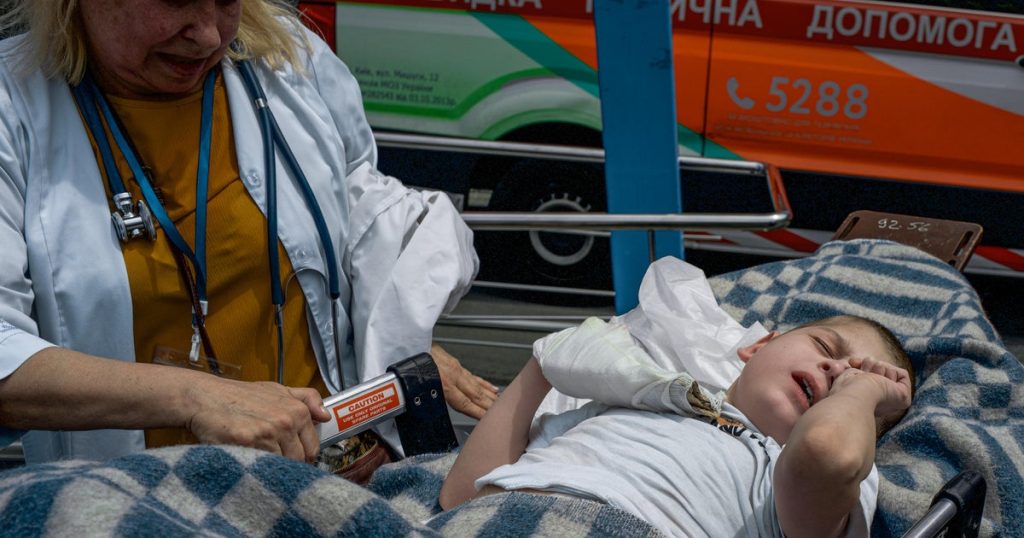On July 8, 2024, a devastating missile attack launched by Russia resulted in the death of at least 31 individuals, including children, as missiles struck various cities across Ukraine, notably a children’s hospital in Kyiv. This daytime assault coincided with Ukrainian President Volodymyr Zelenskyy‘s scheduled visit to Warsaw ahead of a NATO summit in Washington. Amidst the explosions, witnesses reported extensive destruction, prompting calls for increased military support for air defense systems from Ukraine’s allies.
| Article Subheadings |
|---|
| 1) Overview of the Missile Attack |
| 2) Impact on Civilian Targets |
| 3) International Reactions |
| 4) New Developments in Air Defense |
| 5) Continuing Conflict Dynamics |
Overview of the Missile Attack
In the early hours of July 8, 2024, Russia executed a massive missile strike targeting major cities across Ukraine. Approximately 40 missiles were launched, resulting in significant casualties and destruction. Ukrainian armed forces reported that Russian hypersonic Kinzhal missiles were among the arsenal used, renowned for their speed and difficulty to intercept. The attack represents a backdrop to ongoing hostilities between Russia and Ukraine, which have escalated since the onset of the full-scale invasion in February 2022. The rare midday timing of this barrage has raised concerns regarding the increasing boldness of Russian military actions.
Impact on Civilian Targets
The missile strikes primarily wreaked havoc on civilian infrastructure, with the children’s hospital in Kyiv suffering significant damage. Eyewitness reports and images shared by officials depicted rubble and smoke where the hospital once stood, illustrating the severity of the assault. Kyiv Mayor Vitaly Klitschko confirmed that at least two hospital staff members lost their lives, while many more, including children, sustained injuries. These tragic outcomes highlight the indiscriminate nature of the attack, leading many to question the moral implications of targeting such vital facilities. Official reports indicated that at least ten individuals were killed in Kryvyi Rih, where the strikes were focused, further emphasizing the heavy toll of the missile bombardment across various Ukrainian cities, including Dnipro and Sloviansk.
International Reactions
The international community swiftly condemned the missile strikes, with calls for accountability directed at Russia for the civilian casualties. U.N. humanitarian coordinator for Ukraine, Denise Brown, characterized the attacks as unconscionable, especially highlighting the suffering inflicted upon children. Ukrainian officials, including Zelenskyy, have strongly criticized the ongoing aggression, appealing to allies for increased defensive support to mitigate further assaults. Meanwhile, Russian officials dismissed allegations of targeting civilians, instead claiming that their military actions were directed at Ukrainian military installations. This ongoing narrative from Moscow adds layers to the complex geopolitical landscape in the region and presents challenges for dialogue moving forward.
New Developments in Air Defense
In response to the recent uptick in missile attacks, Ukraine is urgently seeking enhanced air defense systems, particularly the U.S.-made Patriot systems, to bolster its defenses against aerial attacks. The Ukrainian Air Force reported successfully intercepting approximately 30 of the 38 missiles launched during Monday’s attack, showcasing their existing capabilities but also underscoring the need for more advanced defense mechanisms. Zelenskyy has continued to advocate for more resources, imploring allies to take action in providing military assistance that can effectively shield civilian areas from Russian assaults.
Continuing Conflict Dynamics
The ongoing conflict shows signs of escalating further following the recent missile barrage. On one hand, Ukrainian forces are striving to reclaim lost territory while bolstering their defensive postures. On the other, Russian military operations remain aggressive, with evidence suggesting incremental territorial gains along the front lines. As the Ukrainian military engages in both offensive and defensive operations, the public remains on high alert, with fears of additional strikes causing widespread anxiety. The cyclical nature of violence continues to erode the prospects for peace negotiations, casting doubts over the future stability of the region.
| No. | Key Points |
|---|---|
| 1 | Russia launched a missile attack across multiple Ukrainian cities, resulting in 31 fatalities. |
| 2 | A children’s hospital in Kyiv was severely damaged, causing numerous casualties. |
| 3 | Strong international condemnation for the attacks, particularly regarding civilian casualties. |
| 4 | Ukraine calls for increased military aid from allies, focusing on air defense systems. |
| 5 | The conflict shows no signs of abating as military operations continue on both sides. |
Summary
The recent missile attacks on Ukraine represent a stark escalation in an ongoing conflict characterized by widespread suffering and destruction. As civilian infrastructure, particularly hospitals, becomes increasingly targeted, the urgent need for enhanced international support grows. The attacks not only exemplify the troubling dynamics of warfare but also necessitate a reevaluation of global military strategies and humanitarian efforts to safeguard vulnerable populations. Continued advocacy for stronger air defense systems remains crucial as Ukraine navigates this intricate scenario marked by violence and political challenges.
Frequently Asked Questions
Question: What types of missiles were used in the attack?
The attack involved various types of missiles, including the advanced Russian hypersonic Kinzhal missiles, which are known for their speed and difficulty to intercept.
Question: What was the primary target of the missile strikes?
The primary target included a children’s hospital in Kyiv, alongside various residential and infrastructure facilities in multiple cities across Ukraine.
Question: How did the international community react to the missile strikes?
The international community condemned the strikes, with calls for accountability against Russia for targeting civilian areas, highlighting the need for humanitarian protections in conflict zones.


